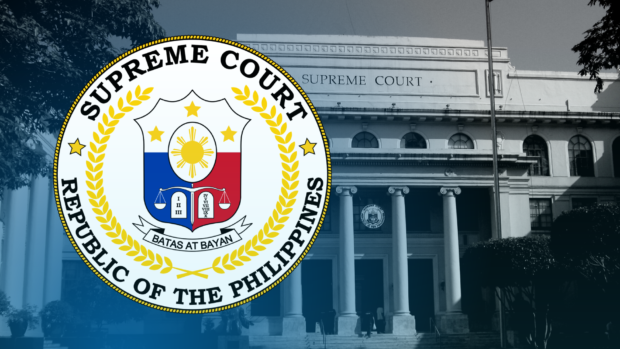
MANILA, Philippines — A cyberlibel case must be filed within one year from the discovery of the crime, according to a Supreme Court ruling that effectively abandoned a doctrine that earlier followed a prescriptive period of 15 years.
The high court’s Third Division, in a decision promulgated only on Oct. 11, 2023, but published on Friday, laid down the new rule after tackling a petition for certiorari filed by Berteni Causing, a lawyer disbarred in 2022.
Causing questioned the dismissal of his motion to quash the cyberlibel charge filed against him by then South Cotabato Rep. Ferdinand Hernandez on Dec. 17, 2020.
RTC upheld
His petition sought to annul the two orders from the Quezon City Regional Trial Court (RTC) Branch 93 charging him with two counts of cyberlibel after Hernandez complained about two Facebook posts by Causing — on Feb. 4, 2019, and April 29, 2019 — which made it appear that the former congressman stole public funds intended for the victims of the 2017 Marawi City siege.
The Office of the City Prosecutors (OCP) found probable cause against Causing, saying he had “malicious intent of impeaching the honesty and integrity and reputation” of Hernandez and consequently exposing the latter to “public hatred, contempt, scandal, ridicule, and disgrace.”
The accused then filed a motion to quash on June 28, 2021, seeking the dismissal of the cyberlibel cases on the ground of prescription. When the motion was denied by the OCP, Causing brought the matter to the Supreme Court.
The Quezon City RTC ruled that cyberlibel is penalized by Republic Act No. 10175, or the Cybercrime Prevention Act of 2012, which prescribes 12 years.
The Supreme Court denied Causing’s petition for lack of merit and affirmed the OCP’s decision.
“Prescription is a matter of defense that requires the presentation of evidence. Hence, the RTC is correct in denying Causing’s Motion to Quash,” the court said.
Doctrine revisited
It noted the Office of the Solicitor General’s comment which pointed out that a certiorari petition was “ordinarily an inappropriate remedy from the denial of a motion to quash.”
Nonetheless, the Supreme Court, through Causing’s petition, said it took the opportunity to review and revisit the Tolentino doctrine, a First Division ruling from the high court dated Aug. 6, 2018, which indicated that under Article 90 of the Revised Penal Code (RPC), the crime of libel in relation to RA 10175, prescribes in 15 years.
Previously, the court in the Tolentino case held that a criminal complaint for cyberlibel filed in 2017 based on a Facebook post dated 2015, or more than two years from publication, was filed within the prescriptive period because RA 10175 made the penalty for cyberlibel afflictive, making the crime prescribe in 15 years.
But the Supreme Court now agreed with Causing’s argument that Section 4(c )( 4) of RA 10175 “did not create any new crime but merely recognized a computer system as another means of committing libel,” thus it should instead be defined and penalized under Articles 353 and 355 of the RPC.
In particular, Causing argued that paragraph 4, Article 9018 of the RPC should be applied to determine the prescriptive period of cyberlibel, as it states that the “crime of libel or other similar offenses shall prescribe in one year.”
“The Court rules in favor of Causing… in determining the prescriptive period of Cyberlibel, the RPC, not Act No. 3326, should be applied,” the Supreme Court said.
The high court likewise pointed out that in the case of Disini vs Secretary of Justice, the Supreme Court reiterated that cyberlibel was not a new crime for it is “essentially the old crime of libel found in the 1930 Revised Penal Code and transposed to operate in the cyberspace.”
Ressa case
The Supreme Court emphasized that prescription “must be counted from the day on which the crime is discovered by the offended party, the authorities, or their agents … because they could hardly be expected to institute criminal proceedings for Libel without prior knowledge of the same.”
In a Facebook post on Saturday, Causing announced that he “won” in the Supreme Court, with the tribunal “siding with my argument that cyberlibel prescribes in one year.”
“Maria Ressa benefits from this, too,” he further wrote, referring to the 2021 Nobel laureate and Rappler chief executive.
Causing could not be immediately reached for an interview, but his post was apparently referring the conviction of Ressa in her cyberlibel case at the Manila RTC Branch 46.
In a 2020 decision, the Manila RTC found Ressa and former Rappler researcher-writer Reynaldo Santos Jr. guilty of cyberlibel over a report that a businessman was allegedly involved in illegal activities.
Ressa’s case sparked controversy because the Cybercrime Prevention Act was not enacted until September 2012, or four months after the article was published.
The prosecution, however, claimed that the story was republished in February 2014, making it punishable under the Cybercrime Law.
The Manila RTC ruled that the crime had not prescribed because the prescriptive period for cyberlibel was 12 years, similar to the decision of the Quezon City RTC in the case of Causing which cited the provision of RA 10175.
READ: Amal Clooney on upcoming Maria Ressa cyberlibel verdict: ‘A signal of what lies ahead’
READ: How the Court of Appeals ruled on Maria Ressa’s cyber libel case
Disbarment
In October 2022, the Supreme Court voted to disbar Causing after he posted on Facebook a draft plunder complaint that mistakenly named an official of the Department of Social Welfare and Development as chair of the agency’s bids and awards committee.
The high court then noted that Causing’s social media post “was motivated by the desire to damage the reputation of the respondents … It was posted precisely to elicit negative reactions, comments and public opinions’’ against the respondents.